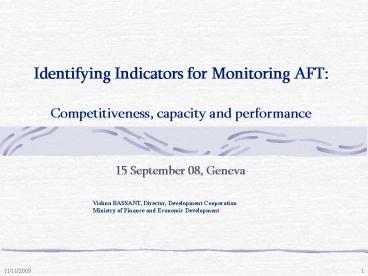Vishnu BASSANT, Director, Development Cooperation - PowerPoint PPT Presentation
Title:
Vishnu BASSANT, Director, Development Cooperation
Description:
AFT pledges have are being delivered and are aligned to recipient agenda ... TRAM. TOTAL. 1. Sugar. Research , Derocking/irrigation. Income Support. 14. 63. 11. 88 ... – PowerPoint PPT presentation
Number of Views:44
Avg rating:3.0/5.0
Title: Vishnu BASSANT, Director, Development Cooperation
1
Identifying Indicators for Monitoring AFT
Competitiveness, capacity and performance
- 15 September 08, Geneva
2
For effective monitoring of AFT
- Beneficiary has an AFT-compliant development
agenda with trade liberalisation at the core.
Must be embedded in regional programs and in EPAs - Programme endorsed by development community
- AFT pledges have are being delivered and are
aligned to recipient agenda - A set of prior actions, triggers and KPIs that
govern disbursement of funds as well as
milestones to ensure that programme remains on
track are agreed to - In the absence of these prerequisites, evaluation
and monitoring cannot be effective
3
The case of Mauritius
- A 10-year AFT-compliant reform agenda initiated
in FY 06/07 to reduce reliance on preferences to
move towards global competitiveness - Main objective is to open up to the rest of the
world for trade in goods (duty free island) and
services, movement of labour and capital. - Agenda also embedded in the regions integration
strategy and interim EPA - In the first year 40 major reforms and over 150
specific measures introduced around 4 pillars - Fiscal consolidation
- Improve Trade Competitiveness
- Improve investment/business climate to be in top
10 - Democratise the economy Participation, Social
Inclusion and Sustainability - Programme endorsed and financed by development
partners (EU, WB, ADB, AFD) - Basket of indicators covering wider reforms
agreed with development partners (8 -10 per year)
4
Selected components of the programme
5
The Results Framework
- Fiscal performance i) stabilize revenue and ii)
reduce expenditure (with increases in pro-poor
expenditures) - Trade competitiveness i) Revamp incentives to
reduce anti-export bias ii) Raise productivity
of existing sectors and iii) Facilitate
development of dynamic new sectors (v)
restructure firms affected by liberalisation
(Enterprise Programme) - Investment climate i) Facilitate investment ii)
Increase labor market flexibility iii) Attract
skilled foreign workers iv) Improve
infrastructure and v) Ensure environmental
sustainability - Democratise the economy i) Improve education
ii) Provide transitional support for unemployed
workers (Empowerment programme) iii) Supply
low-income housing and iv) Strengthen social
safety nets to target the most needy
6
Fiscal Performance
- Reduce primary spending as a percentage of GDP
relative to FY 05/06. - Reduce tax expenditures by 0.5 of 05/06 GDP by
measures enacted in the 06/07 Finance Act. - Use fiscal rules to set budget envelope and
strengthen monitoring to ensure allocations to
line ministries accord with preset ceilings. - Pass legislation to abolish ministerial
discretion over tax and duty exemptions
7
Trade Competitiveness
- First year of phased tariff reduction toward
eventual duty free island by cutting top ad
valorem rate from 65 to 30 percent and reducing
average tariffs by 2 percent - Unify tax and regulatory regimes for EPZ and
non-EPZ firms, with the exception of labor
regulation - Reduce cost of International Private Leased
Circuits by 20-35
8
Investment Climate
- enact Business Facilitation Bill to enable ex
post verification rather than ex ante approval - designate the Registrar of Companies as one a
one-stop center for business registration in the
Business Registration Act - Amend the Planning and Development Act to merge
development and building permits. - transform the trade licensing fee into a single
municipal fee to be paid post business operation
through amendment of the Local Government 2003
Act. - Ease entry of foreign skilled workers by issuing
permits within 3 working days on published rules - Link wages to productivity increases by replacing
present wage setting mechanism with National
Wages Council - Introduce flexibility in recycling labor while
protecting workers not jobs.
9
Democratise the Economy
- Set up machinery for Empowerment Programme to
spend Rs5 billion over 5 years on social
protection, retraining and SME support. - Design measures to facilitate growth of formal
SME sector, including access to assistance,
technical assistance and capacity building, SME
consultancy service - Replace consumer subsidies with targeted cash
transfers, with additional measures to increase
support and opportunities to the poorest. - Evaluation, consolidation and refocusing where
necessary of existing social welfare programs.
10
Improving the delivery of AFT Lessons Learnt
and Challenges
- Need to untie TA , increase TA to MICs and build
local capacity - IFIs and bilateral donors to pool resources and
expedite provision of support in a predictable
manner - Strengthen country offices or set up new ones in
countries that have AFT-compliant programs - Donors need to ensure AFT-compliance when
financing national programmes as is the case with
the EC - Better coordination required with RECs by
seconding staff - Country economists to interact with regional
departments to ensure policy coherence - Regional IDA and Regional ADF should be made more
flexible to support policy reforms in addition to
financing projects - EC support to COMESA Fund may be replicated in
other RECs - Donors need to agree on KPIs to assess the
effectiveness of their responses































